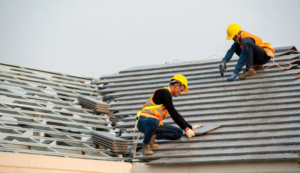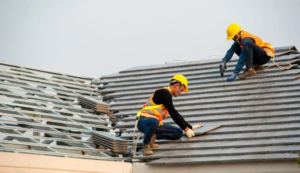A building’s roof is its main defense against rain, snow, sunlight, and temperature extremes. It also protects walls and interior spaces from the elements.
The roof’s peak is called the ridge, and the sloped edges are called rakes. The trough where two slopes meet is the valley, and water collects there before it streams off the roof.

Roofing is the outer layer of a building’s structure, providing protection from the elements. Various materials are used for roofing, from natural products such as thatch and slate to synthetic alternatives like rolled rubber and membrane. The best roofing materials are chosen based on durability, waterproof protection, insulation needs, and maintenance requirements.
Asphalt shingles are the most common residential roofing material, with an average lifespan of 20 years. They are affordable and versatile, coming in a variety of styles, colors and textures to complement any home. Other roofing materials, such as wood shingles, are also available for a more authentic look. Metal roofs are also a popular option, with new technology allowing them to be more durable and energy efficient than before.
Slate is a prestigious and expensive roofing material, with the ability to last over a century or more. This textured and naturally beautiful material is heavy, so it requires strong roof framing to support it. Slate is resistant to fire, winds and salty air, making it an ideal choice for homes in hurricane and tornado-prone areas.
Rubber, or ethylene propylene diene monomer (EPDM), is a waterproof roofing membrane that can be used in flat or low-sloped roof areas. It’s a good option for commercial buildings or as a base layer in green roof construction, and is available in pre-fabricated sheets that reduce installation time.
A more recent innovation in roofing is reflective technology. Certain shingles are designed to reflect solar heat rather than absorb it, which can significantly reduce cooling costs and extend the life of the roof. Roofing contractors can install these shingles along with improved attic ventilation and insulation strategies for maximum energy efficiency.
If you’re looking for a more durable and environmentally friendly roofing solution, talk to your roofing contractor about the latest options in green roofing. There are now shingles that are made from recycled materials and even some that are completely biodegradable. These are just a few of the many new innovations in roofing that can improve the efficiency and beauty of your home while saving you money on utility bills.
Installation
A successful roofing project requires a lot of hard work and skill. It isn’t a job for people who are afraid of heights or don’t have the fitness level to safely and comfortably climb up and down ladders for long periods of time.
During the installation process, contractors will start by preparing your roof. They will cover your yard and surrounding plants with tarps to keep debris from damaging them, and they will cover any open drains in your home to prevent clogging with small pieces of debris. Then they will install underlayment and new shingles in the appropriate pattern.
Maintenance
Surface maintenance includes tasks such as cleaning gutters, removing loose debris and resealing flashing. More involved maintenance involves a more thorough inspection of the entire roof structure to make sure it’s in good shape. It also includes trimming tree branches so they don’t overhang the roof and ensuring that any roof penetrations such as skylights, vents and chimneys are watertight. Professional maintenance services typically perform this work. Home and building owners should always exercise caution when doing rooftop maintenance themselves to avoid falls.
Repairs
Roof repairs are essential for keeping your home structurally sound and watertight. They can include everything from addressing minor leaks to replacing missing shingles and patching holes. If left unattended, these issues can worsen and even compromise the structure of your home. Taking a proactive approach to maintenance with regular inspections and routine repairs can prevent these problems from escalating into costly and disruptive emergency situations.
Leaking Roof Repairs
Leaking roof repair involves identifying the source of leaks and applying specialized sealants or flashing to prevent future water infiltration. This can be caused by a variety of factors, including worn out shingle valleys, damaged or cracked vent pipes, or deteriorated sealant around chimneys, skylights, and other roof penetrations. Proactive leak repair can save homeowners thousands in repairs and structural damage down the road.
The first step in a roofing repair is to remove any shingles and debris that are covering the affected area. This is done with precision to avoid damaging unaffected areas. Then, the flashing is repaired or replaced with care to ensure a watertight seal. The last step is to install new shingles in the affected area with meticulous attention to detail.
Roofing insulation can help improve your home’s energy efficiency by preventing air leaks and reducing heating and cooling costs. It’s important to choose the right type and quality of insulation, which your contractor can help you with. Insulation can also protect your home from storm damages and other weather conditions.
Choosing the right color and material for your roof can make it more attractive, boost curb appeal, and increase your home’s value. A professional roofing company can help you select the best materials and colors to complement your home’s unique style. They can also provide tips on how to maintain your roof and keep it looking its best. With the right roofing, you can enjoy your home’s aesthetics and benefits for many years to come.
